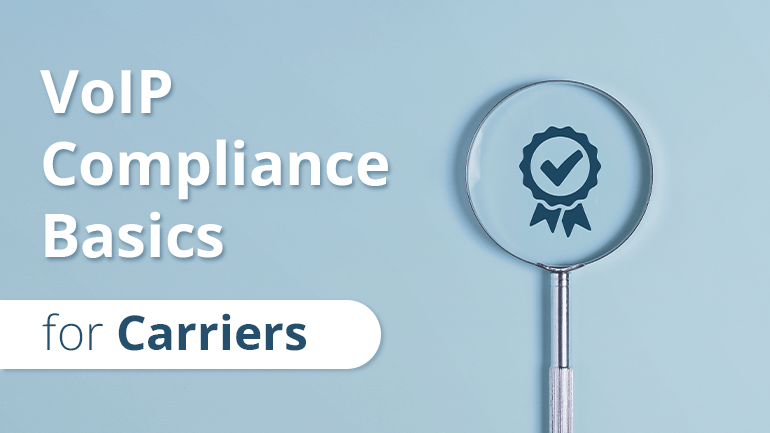For VoIP carriers, regulatory compliance is a very serious business. In most industries, laws are put in place to define what participants can and cannot do. When it comes to VoIP, regulations are imperative to ensure that vital communications services are delivered. Legal requirements cover a wide array of issues, including data protection, privacy, emergency services, and lawful interception.
Even though this article discusses regulatory compliance for VoIP carriers, the content is very relevant to users of VoIP services. After all, we are highly reliant on communications, and it is beneficial to have insights as to how our service providers are governed and what responsibilities they must fulfill.
VoIP carriers cannot be too careful when it comes to adhering to regulations. Any missteps or acts of negligence can have far-reaching consequences. This article aims to provide an overview of some of the key regulatory frameworks that VoIP carriers must navigate to avoid legal repercussions, maintain service quality, and protect consumer rights.
The Implications of Non-Compliance
Non-compliance with VoIP regulations can have serious repercussions and may even threaten the ability of the carrier to operate. Therefore, it is important to recognize that ensuring compliance is not only a legal obligation, but also a business imperative. Some of the implications of non-compliance are as follows:
- Legal penalties and fines – Regulatory bodies have the authority to impose significant fines and penalties that may even impact the financial viability of a business. In April 2024, the Federal Communications Commission (FCC) fined the top US wireless carriers, Sprint, T-Mobile, AT&T and Verizon a collective $200 million for sharing access to customers’ location information without consent.
- Loss of operating licenses – In severe cases, regulatory bodies may revoke a carrier’s license to operate, effectively shutting down their business.
- Compromised service quality – The delivery of first-rate, quality services is an essential goal of many carriers. Even so, as there are a number of regulations that prescribe the quality, security and reliability of the delivered VoIP services to ensure satisfactory performance and safety.
- Reputational damage – Non-compliance can lead to negative publicity and damage a carrier’s reputation. In 2022, the FCC threatened to kick seven Voice-over-IP providers out of its database of trusted carriers for failing to implement safeguards against robocalls. Clearly, customers will be reluctant to rely on a provider that fails to fully adhere to regulatory standards, and this will result in a loss of business.
Key Regulatory Bodies and Compliance Frameworks
So, here is where regulations become complex. Various regulatory bodies around the world oversee the implementation and enforcement of rules and regulations pertaining to VoIP, but these regulations can differ greatly across jurisdictions. In many cases, carriers must consider and comply with several of these regional regulatory bodies due to cross-border communication services.
Some of the key regional regulatory bodies and frameworks that VoIP carriers must navigate are:
The United States of America – Federal Communications Commission (FCC)
The FCC has implemented several regulations specific to VoIP, including:
- Customer Proprietary Network Information (CPNI) Rules – Governs how VoIP providers must handle and protect customer data from unauthorized access and disclosure, including the safeguarding of call records and personal information.
- Communications Assistance for Law Enforcement Act (CALEA) – Directs VoIP providers to ensure that their networks are accessible for authorized interception, such as wiretaps, by law enforcement agencies.
- Enhanced 911 (E911) services – VoIP carriers are required to provide E911 services, ensuring that emergency calls are routed to the appropriate public safety answering point (PSAP) with accurate location information.
- Universal Service Fund (USF) contributions – Dictates the contributions that carriers must make to the USF, which supports telecommunications services in underserved and rural areas.
- Net neutrality – The FCC sets guidelines to ensure that all internet traffic is treated equally and without discrimination, thereby preventing unfair throttling or prioritization of VoIP services.
The European Union – European Electronic Communications Code (EECC)
The EU has established the EECC to regulate electronic communications services, including VoIP. Key provisions include:
- Data protection and the General Data Protection Regulation (GDPR) – An essential regulation that ensures robust data protection and privacy standards. Carriers must implement stringent data handling, storage, and processing practices to secure and protect customer information.
- Universal Service Obligation – Requires that VoIP providers must ensure access to emergency services, maintain service reliability and make VoIP services accessible to all users, including those in remote or underserved areas.
- Net neutrality – The EU enforces net neutrality rules, ensuring the fair and equal treatment of all data transmitted over carrier networks.
- Interoperability and portability – VoIP carriers must ensure that their services are interoperable with other networks and offer the portability of phone numbers.
The above are only two of the many global regulatory bodies. Others include the Office of Communications (Ofcom) in the United Kingdom, the Canadian Radio-television and Telecommunications Commission (CRTC), the Australian Communications and Media Authority (ACMA) and the Japanese Ministry of Internal Affairs and Communications (MIC). In general, the prescribed VoIP regulations encompass similar frameworks to those of the FCC and EECC.
Regulatory Considerations for Carriers
Let’s take a look at the actual VoIP regulations. These laws are designed to address a number of critical subjects, including consumer protection, emergency services, data security, privacy, and fair competition. As stated previously, regulations can vary significantly by region, but there are common themes that we will discuss below.
- Licensing and registration – VoIP carriers must obtain specific licenses and register with regulatory bodies. For example, in the USA, carriers must obtain an FCC Registration Number, and those providing international services may need to obtain Section 214 authorization.
- Data protection and privacy – This is a major issue in most industries today, and telecoms is no exception. Data protection and privacy is not only a legal matter, but is essential for maintaining the trust of customers. VoIP regulations demand stringent data handling, storage, and processing practices. Also, strong encryption protocols must be employed to protect customer data.
- Emergency services access – A subscriber may be fortunate enough to never need emergency services. Nevertheless, regulations are in place to ensure that users can reliably access these vital services in times of need.
- Interoperability – Calls may have to travel through multiple networks from a range of service providers. Of course, this is only possible if different communication systems, networks, and applications work together seamlessly. To make this happen, technical regulations demand the adherence to industry-standard protocols such as SIP (Session Initiation Protocol) and RTP (Real-time Transport Protocol) to guarantee compatibility.
- Interconnection agreements – These days, communications are truly global. Therefore, there are interconnection regulations in place to ensure fair competition and reliable services. One of the most important considerations is that carriers must provide interconnections on non-discriminatory terms and treat all data equally, regardless of source or destination. Also, these agreements stipulate the necessity for carriers to compensate each other for the exchange of traffic, and their obligation to adhere to technical standards that ensure the interoperability of networks.
- Lawful interception – “Big Brother” can listen! It is important that data privacy be preserved, yet there are specific regulations regarding lawful interception (LI). The bottom line is that law enforcement and intelligence agencies have the right to demand access to VoIP data for security and investigative purposes. Therefore, service providers must ensure that their systems are capable of intercepting and delivering call content and call-identifying information to law enforcement agencies.
- Number portability – None of us would like to remain with an unsatisfactory service provider just because we want to keep our existing phone numbers. Number portability is the solution to this issue, and allows subscribers to switch providers and yet retain their telephone numbers. VoIP carriers are required to support number portability, and regulations specify that the process for porting numbers must be streamlined and efficient, minimizing downtime and ensuring a smooth transition for users.
- Security – We all need to know that our transmitted and stored data is secure. Carriers must comply with various regulations that protect the integrity, confidentiality, and availability of voice communication services. These regulations are designed to mitigate risks such as data breaches, fraud, and unauthorized access, ensuring that both carriers and their customers are protected from potential threats.
- Universal Service Contributions – Connectivity for the masses has become a prominent social theme worldwide. To make this happen, regulators in most regions require that carriers contribute to a central fund. These financial reserves are used to ensure that telecommunications services are available to all citizens, including those in rural, underserved, and high-cost areas, as well as low-income consumers.
- Customer education – From the customer perspective, buying and using VoIP services can be perplexing. For example, there may be a variety of service plans to choose from, each with specific pros, cons and billing options. Regulatory bodies understand that informed consumers are better equipped to make decisions about their telecommunications services, recognize potential issues, and understand their rights and responsibilities. Therefore, VoIP carriers are required to comply with various regulations designed to ensure that customers receive accurate and comprehensive information about the provided services.
- Service quality and reliability – The VoIP market is very competitive, and industry participants understand that service quality and reliability are essential components of their business success. However, to protect consumers and to ensure that these critical communications operate reliably, regulations are in place so that VoIP carriers adhere to various standards regarding service quality.
- Net neutrality – Subscribers take it for granted that all internet traffic is treated equally without discrimination or preferential treatment. However, to ensure that this is indeed the case, there are regulations in place that enforce net neutrality. What this means is that carriers are generally prohibited from blocking or throttling lawful internet traffic based on its content, application, service, or device, and that carriers may not give certain types of internet traffic preferential treatment for a fee.
Conclusion
VoIP communications are extremely vital and integral to all of our lives. Therefore, it stands to reason that this industry should be highly regulated to match the indispensable and strategic nature of these services.
Navigating the complex landscape of VoIP regulations is essential for carriers to operate legally and effectively. By understanding the requirements of key regulatory bodies and frameworks, VoIP carriers can develop robust compliance strategies, implement necessary technical solutions, and ensure ongoing adherence to regulations.
Abiding by these regulations is a fundamental responsibility of all VoIP carriers. Compliance not only helps avoid legal penalties and reputational damage, but more importantly, results in the safe and reliable operation of our VoIP services.







